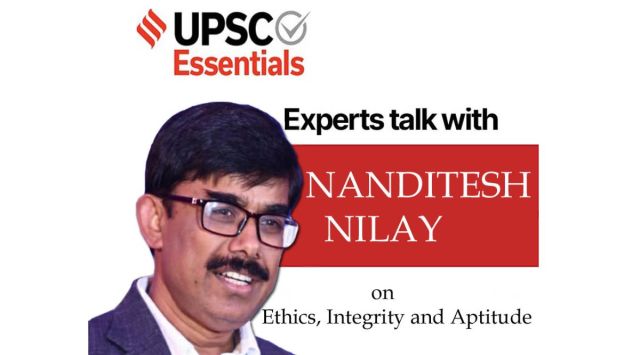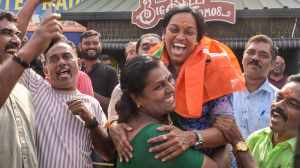
About Dr Nanditesh Nilay
He is the author of Being Good, Aaiye Insaan Banen and Ethikos (Stories searching Happiness). His expertise is in ethics, values, ethical decision-making process among civil servants and Gandhian studies. He has been the expert/consultant to UPSC, SAARC countries, Civil services Academy, National Centre for Good Governance, Central Bureau of Investigation (CBI), Competition Commission of India (CCI), etc. His area of teaching and writing is Values, Ethics and Leadership, Ethics in Governance and many more.
Manas: Ethics paper in UPSC CSE was introduced in 2013 as a part of reform in the pattern and syllabus. Why was this paper included and what did UPSC expect from the candidates through the inclusion of this paper?
Nanditesh Nilay: Victor Hugo has rightly said, “Nothing else in the world…not all the armies…is so powerful as an idea whose time has come.” Since independence, the fundamental issue of implementation of government policies has been always questioned. Why do the aspects of health, hunger or education still haunt our democracy? Why does the poverty line still exist? It was accepted that that commitment and transparency to take the benefit to the last person had been blurry and discouraging. And to save any democracy we need an Ethical compass. The highest impact factor lies with civil servants. Therefore, ethics was introduced as a recruitment filter in civil services.
UPSC certainly would have been expecting from the aspirations to not only qualify this paper but carry that moral intent throughout their career. Nothing more, nothing less. So, bringing ethics in the recruitment process is a great decision of UPSC for its aspirants. It is not baptism by fire but by Human values and most certainly that is what is expected. In the very beginning, let me tell all the aspirants that it is not Ethical Knowledge but Ethical competence which has to be developed. One doesn’t need to be a scholar of ethics but one definitely needs to have an ethical approach and attitude to solve various issues in society as a future officer or simply as a good citizen. This is clearly hinted in the instruction in the syllabus of the Ethics paper.
FYI
The syllabus of the Ethics paper begins as:
“This paper will include questions to test the candidates’ attitude and approach to issues relating to integrity, probity in public life and his problem solving to various issues and conflicts faced by him in dealing with society. Questions may utilise the case study approach to determine these aspects.”
Story continues below this ad
Manas: Looking at the syllabus, one finds a combination of sociology, philosophy, and public administration. The topics make this paper the most intriguing one. But at the same time, it is also one of the most misunderstood papers. Do you agree?
Nanditesh Nilay: Let us understand that Ethics, morality, or values is not an academic subject of discussion only but a process of becoming humane and rational. So, the process of becoming wise and humane cannot be fenced. For example, the theory of Utilitarianism by Mill and Bentham needs a student to turn the pages of philosophy. But to understand the context of utility in that particular time, one needs an inclination for history too. The choice of Utilitarianism depends on the socio-economic process and understanding. So, Sociology and Economics are always there. Who will be working on those principles for whom? Certainly, a human being on other members of society. It means attitude, personality, cognitive process and the resource handling needs a better understanding of Psychology and Management. And without a deeper understanding of profit and loss, numeric culture, data and quantitative analysis, how can somebody move with utility? So here Mathematics appears. Physics is everywhere and so is chemistry. And hunger or health needs proper conditioning in biology. Utilitarianism cannot be distanced from nature. Please have a look at Geography and Botany. It is just an example. What is required is to interlink your basic knowledge with new perspectives and dimensions. Keep thinking of every concept of the syllabus and apply it in your day-to-day life, not just academically. Only then you will be able to write better, and moreover internalize the concepts better. Remember, Ethics is not simple reading. It is becoming.
FYI
The major headings under Ethics, Integrity and Aptitude syllabus are:
Ethics and Human Interface, Attitude, Aptitude and Foundational values, Emotional Intelligence, Contribution of moral thinkers and philosophers from India and World, Ethics in Public administration, Probity in Governance and Case Studies.
Story continues below this ad
Manas: It is generally felt that the demand for Ethics is slightly different from other GS papers. Why do you think this is the case? What should be the approach of a candidate in his/her preparation, especially keeping the Ethics paper in mind?
Nanditesh Nilay: If we are ready to unlearn, learn and relearn then we must be prepared to dive within. Connecting with values, morals and ethics is not a subjective or objective need but an image of an aspirant or a person. It will be validated through the paper on Ethics, or Essay paper and certainly in the interview. The ethical alignment should not be missed. Zero error. One can begin by reading theories, definitions and concepts. But that is just scholastic knowledge. There is more to do. Simply put, the exam selects not just the candidate but his or her thinking, attitude and approach that suits an ethical administrator. Look around, what are the ethical issues? Place yourself in the situation and empathise. Try to think of a solution-oriented person. Hunt for role models and best practices as answers to your queries. As I have mentioned earlier, it is about ethical competence rather than ethical knowledge. So, when someone is preparing or going through this paper one must be simultaneously travelling through the inner self. That should be always kept in mind. It is more like moving from dvaita to advait. Can you reflect this aspect in your answer, interviews and as an administrator later?
Manas: Let’s talk about the theory section of the Ethics paper. The questions may appear very generic, but the real test is the answer writing. What do you think are the key elements to be included in an answer, so that the candidate’s answer script stands out from the others in the competition?
Nanditesh Nilay: Yes, any wisdom is based on knowledge. So it is important to have a better understanding of Western and Indian philosophical approaches towards ethics or inquiry into life. The first and foremost step of preparation will be concept building. Second is relating those concepts with the incidents happening around the world. The third step will be even interrelating and differentiating those concepts while answering the question. Ultimately it will be presenting the self to the examiner and without any ambiguity. And one must remember. Concepts are not statements. They need to be explained.
Story continues below this ad
Manas: Section B of the Ethics paper comprises the case studies. This is where a majority of students face challenges. Can you briefly explain that there is a dedicated section on Case Studies and what type of answers are actually expected?
Nilay Nanditesh: Case studies mean visiting a lab with knowledge buckets. Any case has gross and subtle problems. Read those hidden well. For example,” The officer was witnessing an aggressive crowd coming towards the railway station. The officer was still talking to someone. His team was ready to handle the crowd.” Now here is something that gives us hints about the habits of the officer. Particularly his or her habits not only in general settings. The word “still” speaks something.
So, a sound understanding of theories, ideas and relating effectively with the case should be the moral reasoning of the aspirant. Reading the ethical dilemma and solution around those dilemmas has to be the approach. One should be pragmatic in answering but with ethics only.
Case study needs a structural approach. Reading the case, finding major and minor incidents within the case, picking influencing factors of the case, highlighting subtle issues, noting down major problems, and aligning with those ethical principles.
FYI
Story continues below this ad
We plan to address various aspects of the theoretical section and case studies as “CASELETS” in our Ethics Simplified initiative of The Indian Express.
Manas: We are entering the tenth year since this paper was first introduced. Some experts feel that due to the limited syllabus of Ethics papers, UPSC has exhausted all the questions. There are repetitions and fewer new questions or themes. The others feel that UPSC does surprise aspirants with new elements. What is your take?
Nanditesh Nilay: It is an interesting question. But to answer this question, allow me to quiz your readers with some essential questions of ethics and morality, which have been discussed for a long time. Especially the questions of human evolution, which have been intriguing to the seekers.
Who am I? What is the purpose of life? Why did we come into this world? How should one lead life? What kind of person should be the leader of a country? How to become virtuous? What is the goal of life? Is happiness the ultimate purpose of life? And so on…
Story continues below this ad
Have these questions been specifically answered? No. In fact, it cannot be. Because these questions create a conflict or dialect within and that is the process of human evolution. In the present time, post pandemic, such ethical inquiries have been urgent. The world has been saved not only by chemistry but certainly by human values and ethics too. Where is the space for ethics getting exhausted? Am I an honest person? Am I an honest civil servant aspirant? Am I willing to retire as an honest person? Oh! Who can try to answer this? Only that person who is not barren or dry and evolving gradually. The person who can balance values and results, can only emerge around those values loaded search of mankind. So, we’ll always have to qualify for the first and last hurdle of life i.e. ethics.
Finally, coming to your answer. No, questions are not exhausted.
Let’s say, for example, the whole process of human evolution talks about survival of the fittest and adaptable. We are exhausting natural resources and simultaneously not getting exhausted by human greed. As Mahatma Gandhi righly said, “The world has enough for everyone’s needs, but not everyone’s greed.” Mother earth or a common man can only be saved if the power of chair or mind is governed and guided by ethics only. But not at the cost of delivery. It must be Ethical Decision Making.
So, are future civil servants understanding this aspect of this Ethics paper? That no matter how similar the questions look, can an aspirant reflect his true ethical self through his answers? Can he make the examiner believe through his lucid writing that he looks at the ethical issue through a better lens and has the capacity to give the best solution? The questions may be new or old in the examination or in society in general. Doesn’t matter. The hunt is for a visionary, solution-oriented civil servant. Are you the one?
FYI
Story continues below this ad
UPSC has started asking candidates to comment on quotes. This is not just in the Ethics paper but also essay. The trend is going to remain for a long time. It depends on your thoughts and representation of thoughts in the answer scripts which will help you to stand out in the final examination.
Manas: Often students think that 3-4 months after prelims is enough for the Ethics paper. Are they correct to think so? What do you think should be the right strategy? What is your message for aspirants with respect to the Ethics paper?
Nanditesh Nilay: At least one year to understand the subject and whole life to remain with values, morality and ethics is all about timelines. So, begin before PT and carry it till the last breath. This brings to the last part of the question. My message is simple. Live but ethically. This paper is giving you an opportunity to internalize what you learn and reflect upon your actions. The next few decades of your life will be your contribution to the country and the world, as a civil servant, a leader, and moreover as a citizen. So, think and act wise!
Dr Nanditesh Nilay will contribute articles for Ethics Simplified of The Indian Express from January 2023. We will be covering various dimensions of the syllabus fortnightly.
Story continues below this ad
(The UPSC Essentials Indian Express is now on Telegram. Click here to join our channel and stay updated with the latest updates.
Subscribe to The Indian Express UPSC Key and prepare for the Civil Services and other competitive examinations with cues on how to read and understand content from the most authoritative news source in India.)
Share your views, answers and suggestions in the comment box or at manas.srivastava@indianexpress.com


































